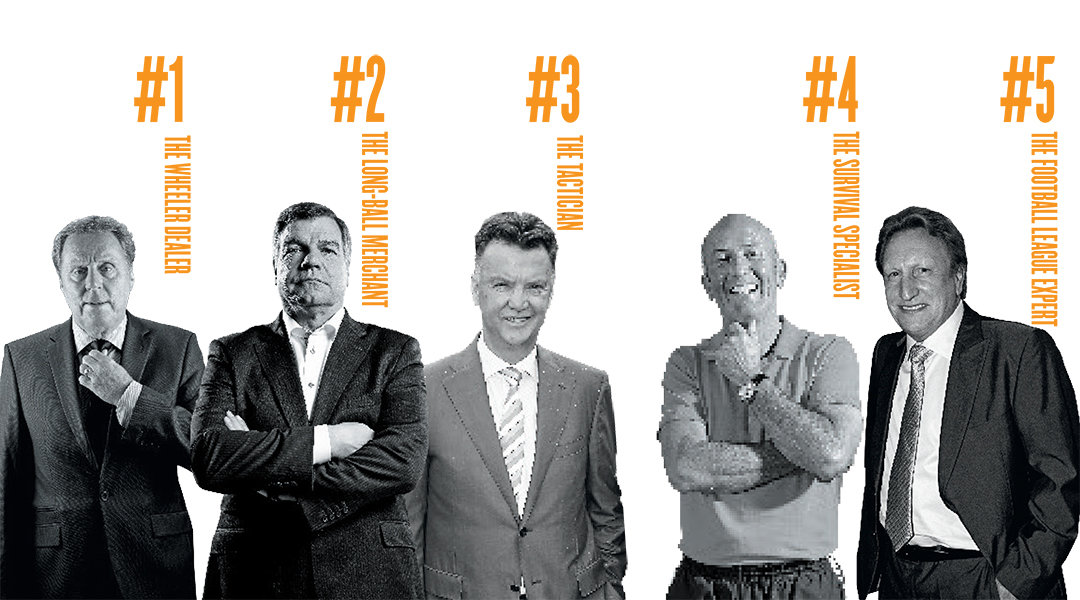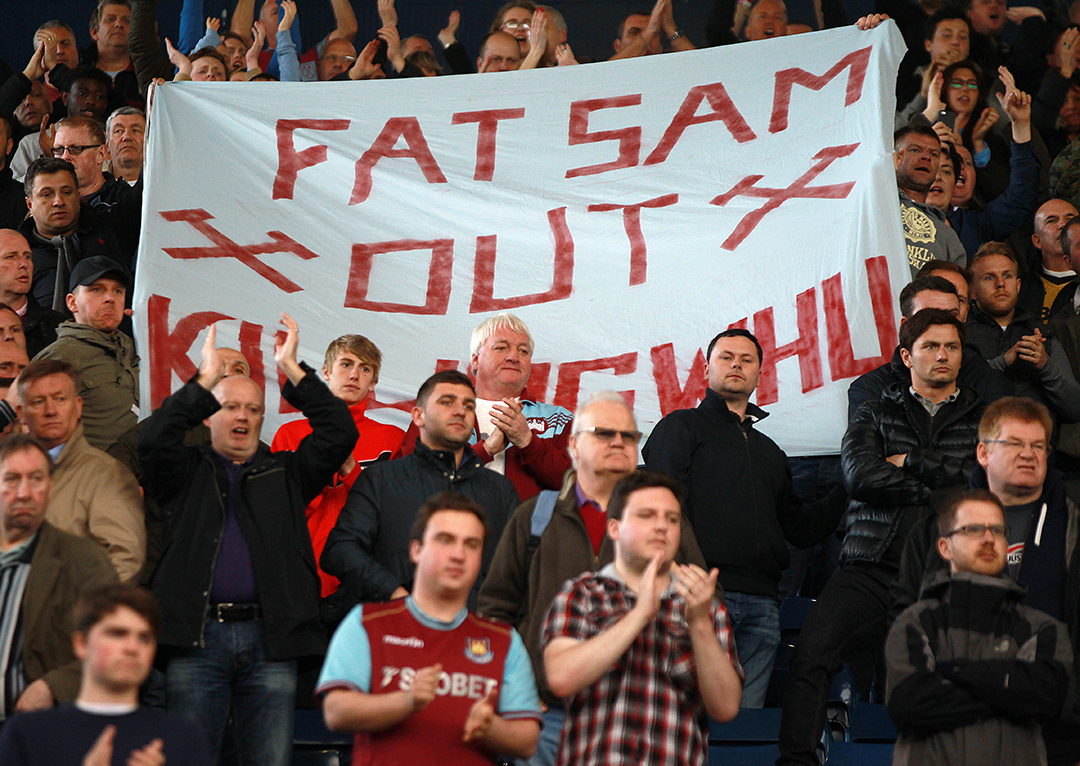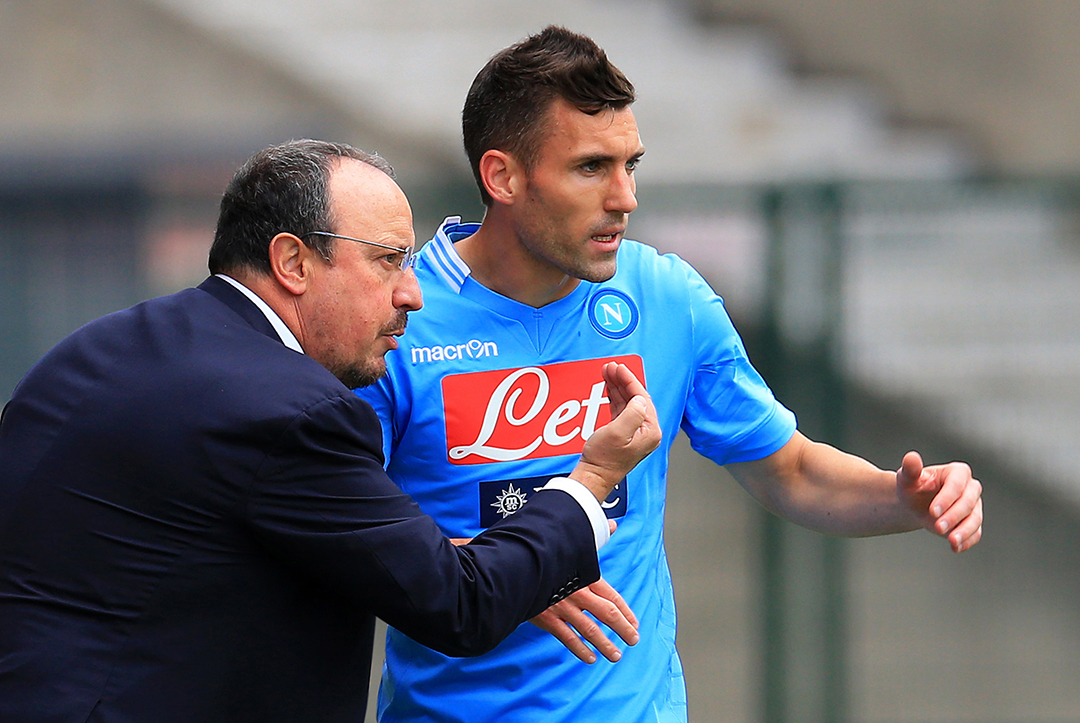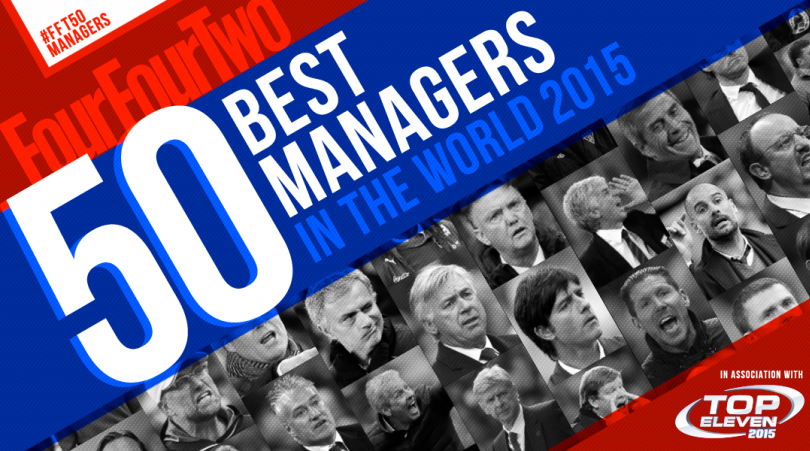Tinkerman, wheeler-dealer, nutter: why do managers get typecast?
Whatever brand of boss your club requires, there’s always one that fits the bill, says Nick Moore...

TS Eliot famously claimed that “April is the cruellest month”, but the Nobel Prize-winning poet never managed a top-flight English football team. Since the inception of the Premier League, it’s November that has become the true wasteland: the sackiest month of the calendar year has borne witness to 21 managers being given their marching orders (compared to 16 in December and 10 in October). Why November? It’s enough games into a season for chairmen to have made up their mind about an appointment that doesn’t seem to be working, yet far away enough from the end of term for them to feel they can give a fresh appointment enough time to turn things around.
It also means that, in boardrooms across the land, suits begin to scour the country for bosses with a specific skill set. This, in turn, has led to an interesting phenomenon: the pigeonholing of managerial types. Thanks to our shared perceptions, a game of football-manager word-association would produce the same results across the country. Ferguson: hair-dryer. Benitez: rotation. Pardew: nutter.
There are those men we see as perfect for getting you into the Premier League, but unable to keep you there (Neil Warnock, Nigel Adkins, Brian McDermott); the Anglo-Saxon swearboxes (Barry Fry, Peter Reid, Graham Taylor); the thoughtful foreign tinkermen (Arsene Wenger, Claudio Ranieri, Mauricio Pochettino).
And who better to replace Pochettino at Southampton last summer than Ronald Koeman, who said that dealing with a Saints exodus was nothing new because it is “the same in Holland” on an annual basis. They replace, promote and carry on. Which is what he’s done. But on a deeper level, does such categorisation matter? And can a reputation, fair or otherwise, be turned to a manager’s advantage?

“I’m not a wheeler dealer – I’m a f***ing football manager”
Perhaps the most typecast of them all is Harry Redknapp. He’s pretty fed up of his image. He snapped, with a latrine-mouthed outburst, when confronted by Sky Sports’ Rob Palmer, who suggested that Harry is the sporting equivalent of Del Boy, trying to swap a moody Citroen Xsara for a crate of Head & Shoulders.
“You made your name as a wheeler and dealer, but there’s not been much wheeling...” began Palmer to the then-Tottenham manager. “No, no, I’m not a wheeler and dealer. F*** off,” interjected Harry. “I didn’t make my name as a wheeler and f***ing dealer. Don’t say that. I’m a f***ing football manager.”
Get FourFourTwo Newsletter
The best features, fun and footballing quizzes, straight to your inbox every week.
Redknapp’s CV suggests he's gifted at buying and selling. But he doesn’t do it much more than anyone else; between 1984 and 1992 he purchased 19 players. Still, he's forever lumbered with an unwelcome billing.
He isn’t alone. Tony Pulis found himself battling assumption while being unveiled as Crystal Palace manager last season. Asked about having never been relegated, the Welshman was irked. “What people don’t talk about is that I’ve been promoted out of every division in English football, I’ve been to an FA Cup final and I’ve been in the last 32 in Europe,” he said.
“Everybody talks about me being a firefighter, but I’ve also been very, very successful as a manager if you spin it around the other way. It annoys me that in this country you do get pigeonholed for certain things.” Subsequently keeping Palace up, then West Brom, probably didn’t help matters.
Perception, however, can bolster a struggling squad even before the new gaffer has started yelling. “In the short term, players react to the reputation of the coach based on what is called ‘legitimate power’ – in which it’s the position, not the person, who holds the power,” says Andrea Firth-Clark, a Chartered Performance Psychologist at headgame.co.uk and senior lecturer at the University of Greenwich.
“Likewise, if a coach has a great reputation, a type of referent power is wielded by them, and this is often the case with celebrity coaches. The player has trust that the coach will bring out their best performance and this expectation can lead to the players working harder. Thus it becomes a self-fulfilling prophecy.”

“I’ve changed my style and changed my ways”
Others don’t mind a preconception so much. Barnet boss Martin Allen has also been dubbed as something of a maniac (you don’t get the nickname ‘Mad Dog’ for nothing) as well as a ‘survival specialist’ – but doesn’t seem overly bothered. “I don’t see it as unfair – I understand it,” he tells FFT. “It does seem to have gone that way for me. When I started as a coach at Reading under Alan Pardew, they hadn’t won for seven games and were close to relegation. We got them up to 10th.
“At Brentford I don’t think they’d won for 17 games, and we stayed up on the last day by one point. Notts County was the same – they looked doomed and we put a run together. It was similar in my earlier spells at Barnet. Only Gillingham was different. But I don’t mind the tag I’ve been given.”
The skills that fit the bill? “Strong leadership. People can lose confidence quickly in football when you’re in poor form,” says Allen. “Fresh ideas and energy can stimulate, motivate and revitalise a squad. With a win, the crowd gets on your side and the players rise to it. One result can turn things around.”
Fresh ideas and energy can stimulate, motivate and revitalise a squad
Players confirm this. “When a new manager is coming in, all the lads will chat among themselves about their reputation beforehand, and it does have a big impact, positively or negatively,” says Brentford goalkeeper David Button.
“You’ll have an idea of what they’re like and that will affect how players behave. If the team is struggling or in a dogfight, a new boss can be a breath of fresh air and restore that belief. Everyone in the squad wants to impress the new boss.”
Allen does agree, however, that bosses are judged in a simplistic manner. “I don’t think people really know what I’m like,” he says. "Over the years I’ve changed my style and changed my ways. I’ve had lots of help from management experts, inside and outside football. I had a much more open, friendly style at Gillingham, rather than laying down a direction very strictly, and the players benefited from that.”

“I don’t let it affect me. I know how to win football matches”
But should the man in the hot seat be more defensive about their image, it can be used as a weapon against them. Ask Sam Allardyce, a man forever associated with long-ball football and forever enraged about it.
After fans sang “We’re West Ham United, we play on the floor” – a chorus of disapproval about his former outfit’s style during a 2-0 win over Peterborough in March 2012 – he had his own Redknapp moment.
“I’m sick of all that rubbish. We’ve lost three at home all season so you’ll have to ask the fans why they aren’t harmonious. I look at the facts, and the facts are that we’ve outplayed them, out-passed them, and against six other teams recently we’ve done exactly the same.”
Other managers got jealous because I kept beating them. I know how to win matches
His branding as a hoofer didn’t germinate in the media, Allardyce claimed. “It started off from other managers many years ago,” he says. “They got jealous because I kept beating them. It’s there and I just have to carry on. I don’t let it affect me personally. I know how to win football matches.” If so many of our assumptions are wrong, why do we make them? “People jump to conclusions massively quickly about people, especially in football,” says Brad Busch, a sports psychologist from InnerDrive.
“Our brains crave certainty and consistency”
“One of the things our brains crave is consistency. We like to put people into categories; it’s a quicker way to make your mind up about things. We often haven’t got the time to process all the information we need to reach a proper conclusion and people struggle with shades of grey. They need black or white.
“There’s a process called the ‘consistency bias’, which means once you’ve labelled someone in a certain way, you’re going to keep doing it. Players improve, but if we think they weren’t good in the first place, we’ll maintain it’s a fluke. Managers change, but we want to keep them in their box. And there’s also the ‘bandwagon effect’. If in doubt, people will follow the crowd, or what ‘experts’ are telling them.”
'Consistency bias’ means once you’ve labelled someone in a certain way, you’re going to keep doing it
Some bosses simply accept one man’s negative pigeonholing as a fairly obvious positive that the haters don’t understand. Rafa Benitez knows he’s a serial rotator of players, and has built a successful career on careful squad management.
Yet whenever a team of his loses, his asset-juggling is blamed; the opposite is rarely true when his sides win. Due to a mental process called ‘negativity bias’, we are more likely to remember and judge people on poor performances than good ones.
Or as Rafa put it, bewildered: “You can’t be criticised and praised for the same thing. If we win then everything is all right; if we don’t, then it’s my fault.” Claudio Ranieri even played up to his ‘Tinkerman’ tag, referring to it so often that some suspected he‘d made up the nickname himself.

“If I sacked three managers in a season, the only person who should be sacked is me”
Chairmen, meanwhile, have a truly tough job trying to work out where the public perception of a man ends and the real manager begins. “One of the things that p*sses me off about football clubs, and how poorly they’re run on a management basis, is the way many people rush to judge managers,” says former Leyton Orient chairman Barry Hearn, who sold his share in the O’s last summer.
“If I sacked three managers in a season, the only person who should be sacked is me. I would hate myself if I had to sack someone so quickly after appointing them. But sometimes we do go on reputation too much.
“Often at the highest level, we judge a manager on his previous playing ability rather than his actual management skills. New talent isn’t getting enough of a chance.”
We go on reputation too much. New talent isn’t getting enough of a chance
Hearn put his money where his mouth is on this when he gave Russell Slade a shot in charge. Slade was part of another fast-emerging sub-set: the manager who never played professionally himself (something he shares with Jose Mourinho and Rangers’ Mark Warburton, among others).
“Russell wanted to work at a higher level, and that didn’t put me off – I wanted somebody who was ambitious.
"If he’s successful, we’re successful. You need to find a chemistry that works for you and your club, so you look at experience, track record, passion. We all want results but you also have to give someone you appoint the time and opportunity to succeed, before judging them. But in everyone I’ve appointed I have looked for man-management ability above all else.” That ambition came to the fore in September: Slade resigned after being linked to the Cardiff job, having previously been threatened with the sack by new Orient owner Francesco Becchetti – a chief who is clearly more trigger-happy than his predecessor Hearn. Number of permanent Orient managers since Hearn left: four. Relegations: one.

“Why the hell did West Brom ever replace Steve Clarke with Pepe Mel?”
Perhaps the most foolish way fans measure managers, however, is based simply on good, old-fashioned xenophobia. Since Arsene Wenger’s fitness-focused, Milky Way-confiscating regime sensibly revolutionised our sport, countless coaches from overseas have been given the opportunity to sit in British dugouts – and they’ve mostly been classified according to appearance.
The English football establishment is equally threatened by, and in awe of, the whip-smart foreign multilinguist. They are therefore boxed off in two ways: either bestowed with some kind of magic wand thanks to their worldliness (if they’re doing well), or seen as unable to handle Saxon grit and fire, the rainy winter Tuesday night in Stoke of legend (if they aren’t).
“Some of the foreign bosses have been amazing, like Mourinho and Benitez, but there have been just as many who are bang average,” says Martin Allen. “Why the hell did West Brom ever replace Steve Clarke, a top, top manager, with Pepe Mel?”
The nonsense of pigeonholing was perhaps most startlingly borne out by David Moyes’ struggles at Manchester United in 2013/14. Replacing one man with another because they have an identical reputation cosmetically (hard, Glaswegian), while ignoring the huge discrepancy in perhaps more important categories (previous results), ended up seeming daft.
“We’re quick to judge, but Moyes doing worse with the same group of players can be down to reputation to a degree,” says Brad Busch. “There were other factors: the players were older, their rivals had spent a lot of money, and there was maybe less pressure on United last season because it was billed as a term of transition before it even began. But every manager is different.”
And that’s the crux of it. When you make a name for yourself, you inadvertently create a brand that becomes established in people’s minds. Nobody can avoid being mentally pigeonholed by their contemporaries, and the only way to truly control the way others think about you is to choose the mental slot you wouldn’t mind being put into, and behave accordingly.
And if that doesn’t work, just do what ’Arry did and tell them where to go.

The managerial archetypes
THE WINNER
From Ferguson to Mourinho to Guardiola to Van Gaal and back through the annals of history, one common thread has run through those otherwise extremely different bosses blessed with success: a hatred of losing. They win because they’re driven by that fear, and resting on your laurels after bagging a trophy is not an option: it’s straight on with planning the next victory.
THE SURVIVAL SPECIALIST
Often a short-term gun for hire, the gaffer tasked with hauling a sinking ship out of trouble will always be blessed with certain key assets: determination and the ability to galvanise and motivate a group that is failing. Nigel Pearson has made this his forte in the Football League, and then with Leicester, while the Prem’s man for a crisis is Tony Pulis, having performed miracles at Palace.
THE SOPHISTICATE
A Wenger legacy, they have a web of contacts across the world, speak several languages and are as interested in sports science, nutrition and other factors that produce ‘incremental gains’ as they are in tactics. AVB was perhaps the apex, but they don’t have to be European: polyglot England boss Roy Hodgson is a perfect, often misbranded example.
THE SWEARBOX
Perhaps a dying breed, but not yet extinct. Epitomised by Barry Fry, Peter Reid, Graham Taylor, Big Ron Atkinson and John “we’ll have a right sort-out in here and you can bring your f***ing dinner” Sitton in various excellent behind-the-scenes documentaries on the manager’s art, issuing bollockings is at the top of their motivational toolbox.
MR INBETWEEN
Seen as a competent, decent gaffer and capable of getting a side promoted from the Championship thanks to their tactical expertise and man-management, they’re never then quite trusted to cut it at the top level – perhaps unfair, considering the resources at their disposal. See Nigel Adkins, Brian McDermott, Owen Coyle, Alex McLeish, Neil Warnock and numerous others.
This feature originally appeared in the December 2014 issue of FourFourTwo. Subscribe!
#FFT50MANAGERS See our full list of the top 50 managers in the world 2015

Nick Moore is a freelance journalist based on the Isle of Skye, Scotland. He wrote his first FourFourTwo feature in 2001 about Gerard Houllier's cup-treble-winning Liverpool side, and has continued to ink his witty words for the mag ever since. Nick has produced FFT's 'Ask A Silly Question' interview for 16 years, once getting Peter Crouch to confess that he dreams about being a dwarf.

